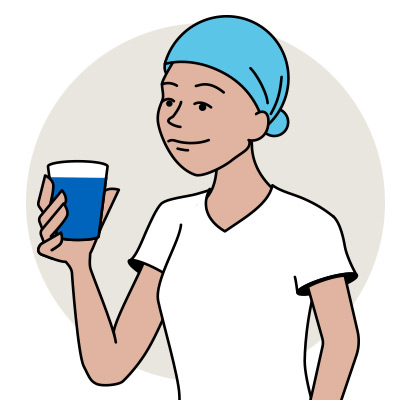Increasingly, doctors are taking a personalized approach to cancer treatment. Factoring in the patient’s health, preferences, and demographic information, treatment usually involves intensive therapy and a strict medication regimen. While the path to recovery may vary, one commonality to almost all cancer therapies is the importance of drinking water throughout treatment.
 Among its benefits are improved digestion, increased focus, and even an upbeat mood. When a cancer diagnosis is factored in, the importance of water increases substantially.
Among its benefits are improved digestion, increased focus, and even an upbeat mood. When a cancer diagnosis is factored in, the importance of water increases substantially.
Find the Motivation to Stay Hydrated
First of all, some of the side effects of certain cancer treatments, including sweating, vomiting, and diarrhea, can be not just demoralizing, but also dehydrating. Anyone who expects to lose a lot of water should be monitoring his or her water intake to counteract dehydration. For example, if it’s common for someone to drink 8 cups of water per day, but that same person experiences intense sweating, they should increase their water consumption to maintain a base level of hydration. Staying hydrated leads to, among other things, increased energy, healthy joints, and heart health.
Even considering the fact that chemotherapy can be dehydrating, staying hydrated also helps those undergoing cancer treatments to flush out toxins that may collect in the kidneys as they go through chemo or radiation therapies. These drugs work to shrink or eliminate cancerous cells, but as a byproduct of this, release toxins that are filtered through the kidneys. As the toxins build up, drinking water helps to flush the kidneys regularly.
The Water Source Matters
As important as it is to hydrate during cancer treatment, it’s of utmost importance to only drink water that is clean and free of contaminants, as another prominent side effect of cancer is a compromised immune system that may make it harder to fight off infections.
It’s of utmost importance to only drink water that is clean and free of contaminants, as another prominent side effect of cancer is a compromised immune system that may make it harder to fight off infections.
While it may not seem intuitive, one of the riskier ways to hydrate is with bottled water. Bottled water is potentially a good option, but before popping the cap, make sure to read the label. While the EPA regulates tap water, the Food and Drug Administration (FDA) regulates bottled water.
The EPA and FDA have different standards of health and some facilities argue EPA standards are more stringent. With recent trends in drinking water, including raw water and artesian water hitting the supermarkets (both of these options aren’t necessarily treated with the necessary disinfectants to rid them of germs), it’s crucial to check carefully before buying bottled water.
Another risky source of water is from private wells. Approximately 15 percent of the US population sources water from a private well. The EPA does not regulate these either. Instead, the owner of the well is responsible for cleaning the water. There are many resources available for testing and treating well water, but it’s important to stay vigilant. If the quality of water drops between checks, it could result in an uptick in bacteria.
The safest method for drinking germ-free water is from the tap (when that tap water is sourced from a city water supply), although even tap was has been known to contain contaminants from time to time.
For anyone looking for an extra measure of certainty that his or her water is as clean as it can possibly be, another option is filtration. There are a number of filtration options for homes that source water from a public utility as well as those that use well water.
Doing research before choosing a filtration system is vital as each system filters for different contaminants. Certain groups provide independent testing of these filtration systems.
One such group, NSF, is a third-party entity that develops standards for clean water, food and consumer products. Their mission: “to protect and improve global human health. Manufacturers, regulators and consumers look to the NSF to develop public health standards and certifications that help protect food, water, consumer products and the environment.”
Products are rigorously tested in NSF labs, according to set standards and certify only products proven to do what they claim.
As they say, at the end of the day, all we truly have is our health. In a moment where your health is compromised, taking extra, active steps to take care of it is of the utmost importance.
